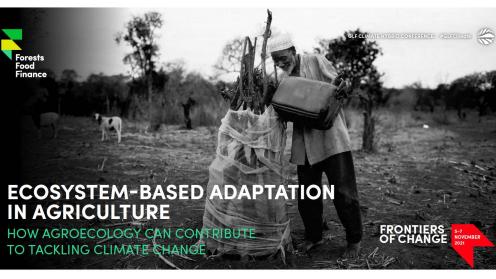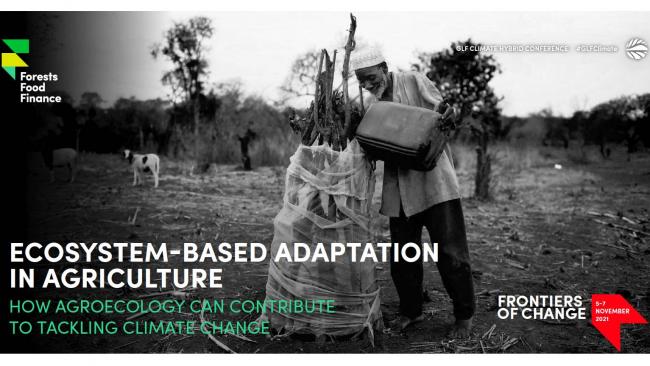Agroecology: Ecosystem-Based Adaptation in Agriculture
The Intergovernmental Panel on Climate Change (IPCC) leaves no doubt climate change is bringing record-high temperatures, widespread drought, wildfires, and increasingly unpredictable floods. At the same time, current food systems contribute to climate change, deforestation and unsustainable land use, and biodiversity loss. The purpose of this event was to present agroecology as part of ecosystem-based adaptation (EbA) for transformational changes in our food systems and emphasize strategic opportunities for joint programmes and strategies among the agriculture and climate change communities.
Highlights of the event included agreement that:
- the current global food system destroys natural ecosystems, contributes around a quarter of global greenhouse gas (GHG) emissions, and is failing to achieve zero hunger;
- systemic responses are necessary to address the systemic challenges posed by climate change, EbA, and agroecology;
- up-scaling should be thought of as creating an enabling environment for EbA and agroecology, which involves addressing long-standing challenges of rural development, such as land tenure security, community empowerment, and inclusive service delivery; and
- new metrics for internalizing negative externalities of agriculture are needed, as are new valuation techniques to account for positive externalities.
This event was organized by the German Agency for International Cooperation (GIZ), in partnership with TMG Research gGmbH (TMG), and CIFOR-ICRAF. It was supported by the Federal Ministry for Economic Cooperation and Development (BMZ) and the Federal Ministry of the Environment, Nature Conservation and Nuclear Safety (BMU).
Opening Session
Harald Lossack, GIZ, moderated this session. He noted that increasing the resilience of the food system through agroecology is an effective way to achieve adaptation to climate change while enhancing ecosystem services and food security. He called for joint programmes and strategies by the climate and agriculture communities.
Thorsten Klose-Zuber, Zukunft – Umwelt – Gesellschaft GmbH (ZUG), Germany, noted this decade is decisive for fighting the climate change and biodiversity crises, saying COVID-19 shows that without healthy ecosystems we cannot maintain healthy societies. He described the work of Germany’s International Climate Initiative (IKI) on agricultural adaptation, calling for scaling this to reduce GHG emissions and increase biodiversity, food security, and small households’ economic opportunities.
Georgina Catacora-Vargas, President, Latin American Scientific Society of Agroecology, Bolivia, noted industrial agriculture is associated with monocrops, genetic uniformity, high volumes of synthetic inputs and energy use, machinery, digital technology, extreme specialization, ecological deterioration, and negative social impacts. She said agroecology relies on native and locally-adapted plants and local knowledge for restoring biodiversity and also improves the livelihoods of smallholders, especially women, through increasing access to land and credit. She said agroecology includes social and economic principles to transform food systems
Jes Weigelt, TMG, summarized the key messages of the TMG-ICRAF white paper on Ecosystem-based Adaptation in Agriculture. He called for the agroecology and EbA communities to jointly build on their common principles, policies, and strategies in order to address the political and structural issues surrounding rural development. Up-scaling of EbA and agroecology requires addressing these structural issues; it cannot be reduced to multiplying successful pilot projects by increasing financial resources. Joint strategies by the EbA and agroecology communities are key to developing the necessary leverage to address these structural issues.
In the ensuing discussion, Klose-Zuber said the agricultural transformation must include cooperation among all stakeholders. Catacora-Vargas called for institutional and political measures to support conversion from industrial agriculture to agroecology.
Country Presentations
Friederike Mikulcak, GIZ, moderated this session.
Catacora-Vargas described Bolivia’s legal framework which: declares agroecology a national interest; addresses administrative mechanisms for fostering agroecology; promotes sustainable consumption; strengthens indigenous approaches; and broadens knowledge dialogues to all communities. She said the laws provide for social and political development and prioritize agroecological innovation, but remaining challenges include: too much support for industrial agriculture; insufficient support for agroecology; limited opportunities for realizing non-monetary benefits; discriminatory market approaches; and cooptation of agroecology as solely technical approaches such as “monocrop with biological inputs.”
Judy Matu, National Chair, Association of Women in Agriculture, Kenya, reported that Kenya’s climate-smart agriculture addresses farmers’ basic needs, especially the needs of women, who comprise 65% of agricultural labor but lag behind in economic development, health, and education. She called for equipping them with capacity for climate resilient approaches. Specifying agroforestry and urban farming as key sectors, she called for partnerships, alliances, and joint action plans.
G. Muralidhar, Co-Lead, Andhra Pradesh Community Managed Natural Farming (APCNF), India, said this programme has resulted in decreased farming costs, increased yields and returns, enormous savings in water and energy, and benefits for, inter alia, soils, health, nutrition, employment, climate, and ecosystems. He added that it uses: no chemicals; multi-layer crops; microbes; indigenous seeds; local inputs; and “communitization.” He said farmers pay approximately USD 200 upfront but their returns can be 20 times that, with non-economic benefits even greater, and called for “saturating the world” with this model.
In the ensuing question and answer session, panelists addressed how to shift the power structure favoring industrial agriculture, suggesting, inter alia:
- policies prioritizing food security, ecological efficiency, and conservation of biodiversity in land use;
- metrics for internalizing industrial agriculture’s negative social and environmental costs;
- mechanisms to measure productivity;
- promotion of local food systems;
- decentralization of production systems;
- local circular value chains and use of communal economics logic for non-monetary benefits; and
- fairer share, rather than monetary incentives for agroecology.
Lessons and Closing
Ulrich Apel, Global Environment Facility (GEF), said GEF finances integrated approaches. He highlighted key points, including the need to:
- move from “boutique scale” agroecology to address entire food systems;
- mainstream agroecology in national and subnational policies as a precondition for financing;
- remove the 90% of food system subsidies that give perverse incentives;
- coordinate policies for financing streams to shift to nature-positive investments and ODA financing;
- work along the entire value chain to shift screening practices and safeguards; and
- de-risk investment for the private sector and create good revenue for agroecological farmers.
Fergus Sinclair, CIFOR-ICRAF, called for: addressing whole food systems; eliminating perverse policies and creating enabling ones; integrating all related sectors, including water, forestry, and trade; creating landscape-level capital and policy institutions; and shifting power to benefit marginalized groups, including women and consumers. He noted that if different ministries have common principles their initiatives can be brought together. He called the principles of the High Level Panel of Experts on Food Security and Nutrition a useful framework for guarding against greenwashing. He urged equity and co-creation of knowledge between scientific and local communities for solving problems.
Friederike Miculcak said agroecology is a highly promising, yet insufficiently acknowledged, EbA strategy in agricultural landscapes. Alliances, partnerships, new funds, and blended finance are urgently needed and already emerging, but more policy coherence and new metrics are necessary for scaling. She called on everyone to work toward this goal.
Contact
Wangu Mwangi | wangu.mwangi@tmg-thinktank.com
Friederike Mikulcak | friederike.mikulcak@giz.de
More Information
The potential of agroecology to build climate-resilient livelihoods and food systems
Adaptation Community
To receive free coverage of global environmental events delivered to your inbox, subscribe to the ENB Update newsletter.











